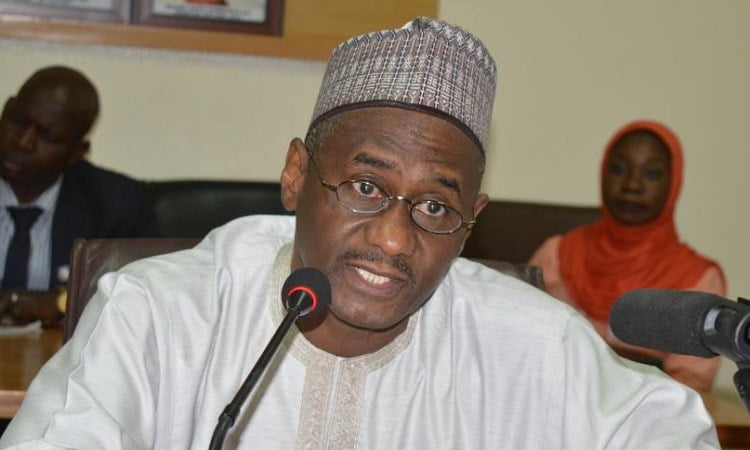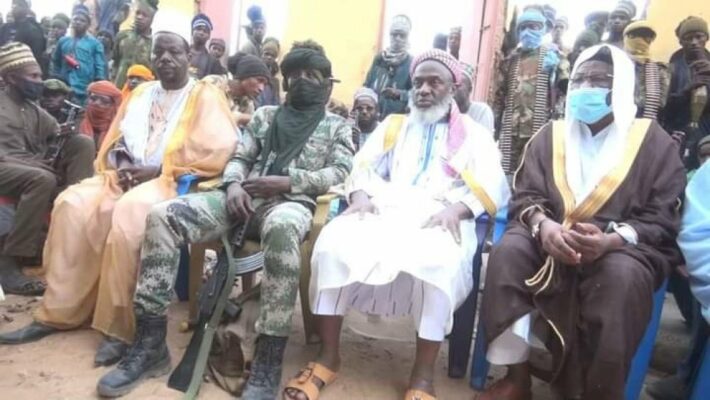With the quest for general amnesty for the armed bandits terrorising most parts of Nigeria’s North west region – and the connecting highways which run across the country – almost a fait accompli, many are beginning to wonder how we, as a people, got to this sorry pass.
How come, indeed, that leaders of a murderous band of criminals have, suddenly, before our very eyes, become the victims. And those at the receiving end of their banditry, villains?
Professor Usman Yusuf, an acerbic Fulani leader who recently accompanied Sheikh Ahmad Abubakar Gumi on tour of camps of some top bandits, instead of helping provide answers to these posers, rather reinforces same.

“You know the Fulani; what has any government done for them for the 60 years of this country? Anything? Is it hospital, school, electricity, borehole? Nothing. They have never received their fair share in this country,” Yusuf said in an interview published by Saturday Sun of February 13, 2021.
For the records, Yusuf number among past and present leaders of the North west, nay the entire country, who have denied ordinary folks the basic necessities of life, which he so glibly enumerated in the aforesaid interview.
Appointed Executive Secretary of the National Health Insurance Scheme(NHIS), in July, 2016, Yusuf was eventually sacked by President Muhammadu Buhari, in July 2019, having breached certain provisions of the nation’s Public Procurement Act. Before his cantankerous tenure eventually terminated mid-stream, Yusuf had, twice, been placed on suspension by both the then Minister of Health and the Governing Board of the NHIS.
Contending that “no military throwing bombs here and there” can win the war against the bandits, Yusuf maintained that only amnesty would get the outlaws to return their guns, as “it will get them to get employed and make them to get amenities that you and I have been enjoying.”
And like an ideology long enunciated and agreed upon, Gumi gives fillip to Yusuf’s standpoint. Lumping all forms of agitation – be it clamour for restructuring, self-determination, equity or true federalism – into one straight jacket, Gumi describes advocates of each as miscreants, who are “all the same group of people with Boko Haram.”
Continuing, he urged Yoruba and Igbo leaders to take “care of their miscreants, as we are handling herdsmen and Boko Haram which are miscreants in the North.”
Fair enough. But many wonder why the trenchant believe that in taking care of the North’s “miscreants”, federal resources must be used, while the other zones, especially the East, is left floundering.
Yet, this is the same region(South east), which 50 years after, is still being denied the promises of Rehabilitation, Reconstruction and Re-integration, made at the end of the Nigeria Civil war.
Sheikh Gumi proffers an answer:”Since the Niger Delta militants were integrated by the Federal Government and are even in the business of pipeline protection, the Federal Government should immediately look into how something like that will be done for the Fulani, to provide them with reasonable means of livelihood including jobs, working capitals, entrepreneurship training, building clinics and schooling.”
Standing alone, the above would seem to be altruistic demands, but put side by side the Niger Delta agitations, as Sheikh Gumi seeks to do, the difference between both is akin to that between apples and oranges.
For while the Niger Delta issue revolved around derivation principles and globally accepted frameworks for compensating communities environmentally impacted by despoliation caused by oil exploration – for which the entire country benefits – who, basically, is to be blamed for the lack of social amenities which the eminent Sheikh enumerated?
In fact, given the dominant number of local government areas, states and federal institutions domiciled in the North, I dare say that more of the country’s resources go to the area year and year.
Thus, instead of looking leaders from the area right in their eyes and pointing at their apparent failing, the Sheikh is going about the issue, using the same old tactics that led to the problem in the first place: request and get more money from the centre to throw at the problem.
Even in the South, against the backdrop of government’s sing-song that there aren’t enough resources to go round, individuals and communities have often risen to the challenge, building schools, constructing boreholes, setting up entrepreneurship centres, engaging private vigilante services, and in some instance, employing teachers and doctors to render service.
Nigeria: The odyssey of a good (hapless) woman (1)
Perhaps, conscious of these facts, outspoken Governor of Kaduna state, Nasir el-Rufai, quite easily dismisses the amnesty gambit, insisting that any bandit caught in his domain would be killed.
“Anybody that thinks a Fulani herdsman that is engaged in kidnapping for ransom and is earning millions of naira would go back to his former life of getting N100,000 after selling a cow in a year, must be deceiving himself,” the governor said last week in an interview he granted the Hausa Service of the British Broadcasting Corporation(BBC).
Continuing, el-Rufai queried:”Why should we compensate them after killing people, destroyed their houses? Who offended them?”

Pointing at lack of unity among, especially governors of the North west, in addressing banditry, he disclosed that while some are against any form of dialogue with the bandits, others remain in clear support of such steps.
His words:”We (governors in the North west) are not united to work together to eliminate these bandits. We in Kaduna and Niger states are communicating on how to end this problem.”
Somehow, in the midst of this hazy amnesty ploy, not a single thought is spared victims of the unprovoked attacks by the bandits. In spite of the almost daily sacking of entire communities, raping of their female folks, burning of their property, and killing and maiming of inhabitants, they get neither compensation nor soothing words.
Ironically, same week, the country’s Information and Culture Minister, Lai Mohammed, gave tacit approval to Gumi’s amnesty overtures, saying, “if granting amnesty to a warlord will lead to the surrendering of many others, I will take that decision.”
Speaking on a TVC program anchored by Yomi Folarin last week, Mohammed said:”When you want to resolve an issue like that(banditry/insurgence), you use a lot of back channels. Again, it is not unusual for a respected cleric to have the confidence of outlaws or bandits. As a matter of fact, they’re probably more likely to listen to him, than they will listen to government.”
As it stands, what Sheikh Gumi and his co-travellers seem to be telling the rest of us is, to paraphrase an American lingo, ‘though he’s(bandits) a son of the gun; but he’s our own son of the gun.’

In deed, just as this column was about going to bed, the country’s Attorney General and Minister of Justice, Abubakar Malami (SAN), called for the creation of a federal agency to regulate the activities of herdsmen.
Speaking as a special guest at the Peace, Unity, and Security Lecture Series at the ECOWAS main auditorium, Abuja on Tuesday, February 16, 2021, said that in addition to the agency for pastoralists, there was need for the “revamping of the activities of the Nomadic Education Commission with a view to complementing the efforts of the government in resolving the farmer-herder clashes.”
Malami, like Sheikh Gumi, further recommended the provision of water holes in remote locations, subsided veterinary care, and provision of infrastructure – social amenities, educational facilities, and cattle markets at central locations – to accelerate nomadic settlements.
Talk about the village witch crying at night, and a baby dying at dawn.
For the rest of us, we’re only left wondering, if what is afoot is tantamount to rape: taking from the commonwealth by brute force; or simply, yet another act of goodness by Nwanyiafoma, the good-natured woman who never says ‘no.’
. Concluding part of a two-piece article, first published on Monday, February 15, 2021.
Truth is that the country Nigeria is about disintegrating faster than predicted.
I won’t be suprised if President Buhari serves as Nigeria’s last President.